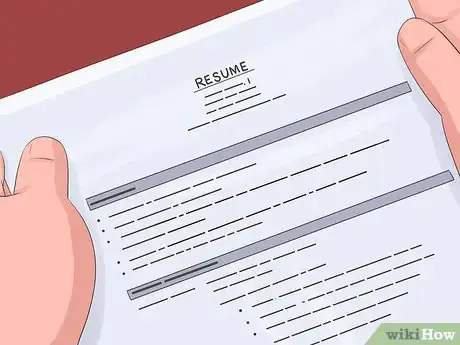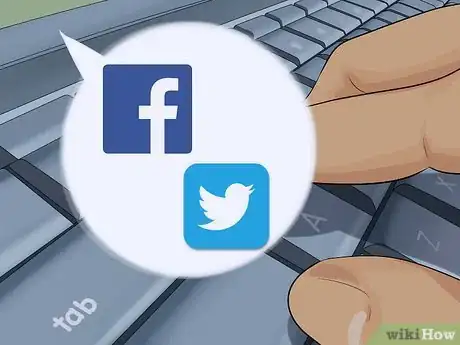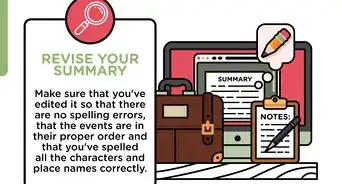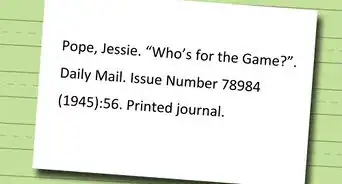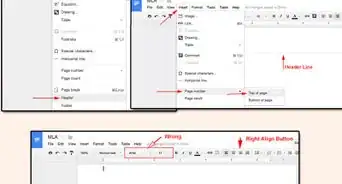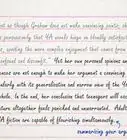This article was co-authored by wikiHow Staff. Our trained team of editors and researchers validate articles for accuracy and comprehensiveness. wikiHow's Content Management Team carefully monitors the work from our editorial staff to ensure that each article is backed by trusted research and meets our high quality standards.
There are 7 references cited in this article, which can be found at the bottom of the page.
wikiHow marks an article as reader-approved once it receives enough positive feedback. In this case, 97% of readers who voted found the article helpful, earning it our reader-approved status.
This article has been viewed 27,876 times.
Learn more...
Copywriting is a diverse field in which you write and edit content for ads, marketing campaigns, websites, and more. There is no specific educational pathway to become a copywriter and many people get into the field later in life. If you want to work in copywriting, work on developing the right skills, seeking out work, and then taking steps to continue your career.
Steps
Developing Your Skills
-
1Look for opportunities to write. Experience writing for a specific audience is one of the most important skills a copywriter needs to develop. You may have to do work for free at first as a way to prove yourself. For example, if you're involved with a political organization you can volunteer to revamp their Facebook page. You could also write blog posts for a local charity or team up with a freelance graphic designer who needs some web copy written for an ad he's working on.[1]
-
2Build a portfolio. Your portfolio is a collection of your published work you will give to prospective employers. When it comes to copywriting, a solid portfolio is as important as a resume. Start looking for opportunities to publish your work. This way, you'll have material from which you can build a solid portfolio.
- Before you get your first job, your portfolio may be a little sparse. That's okay. If you have a strong voice and solid writing skills, you may still get a call back even if you lack experience. Cobble together anything you've written that's been published, no matter how small. You can include an opinion piece for your school's newspaper, for example, or something published on a small scale blog or online magazine. One caveat, however, is that you should strive for marketable content. A list of the best dive bars in your college neighborhood is a better choice for your portfolio than a heartfelt personal essay that was published on a site like The Rumpus.
- If you have nothing to show, make things up. Choose a product or service and start brainstorming (it’s called “concepting” in the ad business.) Choose something that’s not so easy. Everyone wants to do perfume, liquor, cars, condoms, and beer because everybody already wants them (well, not so much the condoms) and you can do basically anything you want as long as it’s arresting. Try toilet bowl cleaner or socks, shingles: there’s a challenge. Creative directors want to see you can find something fresh and interesting no matter what, because fresh and interesting is the whole game.
- Develop an ad, a series of blog posts, some tweets, a TV script, whatever seems like it would get some consumer action. Make it really good. Try it on friends. If you can, get a designer friend to mock it up. But only put the mockup in your portfolio if it’s really good. Bad design kills a concept. Put the finished piece in your portfolio and do another. Three is a minimum. The more you have (up to a point), the more you look like you want it. Creative directors want to see that you want it.
- Publishing work is increasingly easy in the digital age. There are a vast variety of websites, catered to many different interests, that take submissions for brief, shareable content. If you're reading a list on a website you enjoy, go over their submission guidelines and consider putting together a piece for them.[2]
- Cater your portfolio to the job you want. If you want to work in nonprofit, for example, writing an article for your local humane society could be a great addition to your portfolio. If you want to work in the service industry, however, try to publish a piece for an online magazine on something like the best Mexican restaurants in your city.
Advertisement -
3Consider an education. For copywriting, no specific degree is required. However, individual jobs may request candidates have a bachelor's degree. It's a good idea to get some kind of degree if you want to go into copywriting.
- Courses in journalism, professional writing, and marketing may help with a copy writing degree. Consider a bachelor's degree or minor in one of those fields.[3]
- If you already have an unrelated degree and want to get into copywriting, consider taking an online course in a relevant field. This may help prepare you for copywriting as a career and give your resume more legitimacy when sending it out to clients and agencies.
- While a degree or related coursework can help, an aptitude for writing is the most important requirement for a copywriter. If you have a biology degree, for example, but keep up an active blog, you may just as easily land a copywriting position as a creative writing major. While education can help, keep in mind it's not the most important key to a career in copywriting.[4]
-
4Gain experience in advertising and marketing. Perceptiveness is very important to copywriting as a career. Jobs that require you to work with people may help prep you for a copywriting career. Consider taking an internship or part time job at a marketing or advertising firm. This will allow you to gain insight into how company's attract clients.[5]
- If you're still in college, a marketing internship can be a great way to kickstart a copywriting career. You could also consider taking a marketing or advertising class.
- A retail job could also help bolster your resume, as this entails selling a product and working with people. You could try working a part time job at a popular clothing store at your local mall, for example.
-
5Read as much as you can. Copywriters need to understand how good writing looks and sounds. You'll be writing commercially, so your work is not expected to be literary in quality. However, reading works of quality fiction and nonfiction can help you gain better language skills. The works of Ernest Hemingway can be particularly helpful for copywriters. When writing copy, less is always ideal and Hemingway was known for his minimalistic writing style.[6]
- You should also read actively when simply browsing online content in your free time. For example, when navigating a Facebook pause and consider the language, the length, and the audience the ad is targeting. Take every encounter with advertising, web copy, or other content as a learning experience.
-
6Start a blog. A blog is actually an incredibly valuable marketing tool when it comes to copywriting. Starting your own blog can showcase your voice and writing skills. If you want to get into copywriting, it's vital you start blogging. You can include a link when messaging potential employers so they can get a feel of your writing.
- A blog can have any topic you choose. Some people find it easy to blog about a hobby. For example, if you love baking you can start a baking blog. If you're a knitter, blog about knitting. You can blog in a way that's marketable. You can make lists of products you enjoy using for your hobby, for example, which showcases you ability to advertise a product.[7]
- Keep your blog creative but professional. Avoid cursing and other bad language. If you choose to post about your personal life, keep it work appropriate. Never complain about an employee, past or present, on your blog.
- As you continue to establish yourself in the copywriting game, you can add links to your work and writing samples on your blog.
Seeking Work
-
1Look for early opportunities. When starting out, opportunities may be hard to come by. With limited experience, it can be difficult to land a job. You may have to start out doing part-time or unpaid work.
- If you're still in school, look into an internship that involves writing or editing. An internship looks great on a resume and gives you invaluable professional experience.
- You can also take small freelance gigs. You can apply to such jobs on places like Craigslist. Often, employees are looking for copywriters to do a single article or blog post for them. You may get a paid a very small fee, but it can help build your resume and gain contacts for the future.
- As previously stated, volunteer copywriting is also a good idea for early experience. Writing for a local charity's newsletter or web page may not pay. However, you'll gain something to add to your resume.[8]
-
2Network and learn from people in the business. If you can, get coffee dates with creatives. Writers or designers, it doesn’t matter. Ask them to describe their days, what they love, and what they hate. Most of the people love to talk about themselves, but some of them are reluctant heroes. Ask them how many hours a week they work.
- Ask them to email you a creative brief. A brief is the bible. Among other things, it contains concise, exact descriptions of audience, strategy, and mandatories (stuff you have to shoehorn into the concept or at least into the copy). A kid coming in knowing what a brief is will impress a creative director.
- If you talk to a copywriter, ask for a copy document. Format any copy in your portfolio like the agency document. This makes it look like you know something about the business.
- One note: briefs and copy documents are internal documents. Ask politely and make clear it’s just for you to study.
-
3Build a resume. If you're ready to begin seeking full time copywriting work, you'll need a resume. A resume is an invaluable tool when it comes to marketing yourself to potential employees. There are some specific considerations to keep in mind when making a copywriting resume.
- You should follow typical resume format when it comes to things like basic layout. Choose a professional, easily readable font. Any choices you make regarding things like spacing, bullet points, and use of bold and italics should be consistent. Always include contact information, like your name, e-mail, and phone number, near the top of your resume.
- Emphasize your skill set first. Include a section in which you list your copywriting experience. This is where you would include things like past publications, your blog, and any areas of expertise you have. You can include technical skills, like experience with sites like WordPress. You should also include what kind of copywriting you typically do, like whether you've done brochures, online ads, social media copy, and so on.[9]
- List only relevant jobs. Jobs in marketing, sales, advertising, or business are appealing on a copywriting resume. Jobs in creative writing and journalism may not look as great, however. While both career-paths include writing, copywriting is mostly focused on marketing and sales. An employer may be wary to take a chance on someone whose experience is mainly rooted in non-commercial writing.[10]
- Keep your education towards the bottom. While many traditional resumes have the education section listed at the top, a specific education is not necessarily important for a copy writing job. Prioritize your skill set, publications, and experience over your education.[11]
-
4Practice good interview skills. In the event you're called in for an interview for a copywriting position, make sure you practice solid interview skills. A successful interview can help you land the right job.
- Always research the business before going into an interview. You want to have some sense of a company's history, ethics, and atmosphere. Do some research on a company's website and browse their social media profiles.
- Dress up for an interview. While you're on the job hunt, have a few go-to interview outfits ready. For men, a button down shirt and tie with dress pants is always a good choice. For women, a nice skirt and blouse, a suit, or dress pants and a nice top can work. Make sure to wear dress shoes as well. You don't want to offset a professional outfit by wearing sneakers with it.
- Arrive a few minutes early and try to make a good impression on everyone. Be polite to the person who checks you in and offer a smile to anyone you see in the hallway. Use body language to convey confidence when first meeting the interviewer. Give a firm handshake, make eye contact, and smile and nod during the interview to show you are listening.
- Ask questions at the end of the interview. You should not merely ask questions of logistics, like, "When can I expect to hear back?" Ask open-ended questions that convey a genuine interest in the company. For example, ask something like, "What's your company's culture like?" or "What do you like about working here?"
-
5Navigate a phone interview. Many current copywriting positions entail remote work. Copywriters often do temporary or freelance work for a client and the hiring process may involve a brief phone conversation. Learn how to navigate a phone interview in addition to an in-person interview.
- When you know the call is coming, make sure you're in the right place. Find a quiet place, free of distractions. If possible, you want to be at your own home or apartment as it's easier to minimize outside noise.[12]
- If you need any documentation, have it ready to go. Keep your resume close by during the reference, as well as any other information the interviewer asked for. For example, if the interviewer wanted to know your hours of availability, have your schedule in front of you during the interview.[13]
- Smile while on the phone. Even if it feels silly, smiling can actually subtly change your tone of voice. You may sound perkier or more interested if you smile during a phone interview.[14]
- Follow up in writing. When the phone interview is complete, send an e-mail the following day. Thank the interviewer for taking the time to talk to you and express your continued interest in the position.[15]
-
6Seek work from nonprofits. Nonprofits are often a great route for copywriters just starting out. They're always on the lookout for quality writers to write brochures, press releases, web copy, and more. You also may find this work more fulfilling as you're helping a worthy cause rather than just selling a product. If you're looking for work as a copywriter, browse the websites of some organizations you support. See if they're currently hiring copywriters.[16]
-
7Try freelancing. If you can't find a stable position at first, you can keep your resume free of gaps by freelancing. You can work with individual clients on a case-by-case basis, charging a fee for your services.
- Crowdsourcing sites, such as Copify, often have posts looking for freelance copy writers. You can start contacting potential clients through websites like this, e-mailing out your resume and portfolio.[17]
- You can also go to local businesses and see how much they typically pay for copywriting. You can develop a competitive rate from there and provide them with your resume and portfolio. Tell them to give you a call if they want to hire you as a freelancer for a job.[18]
- Keep in mind you'll probably have to have another job on the side if you're freelancing. Freelancing work is not always reliable and you may not be able to count on freelancing alone to pay all your bills and living expenses.[19]
Continuing Your Career
-
1Add to your portfolio. As you continue to work in copywriting, add to your portfolio. If you did a particular ad or blog post that went over well, add that to your portfolio. Always look for opportunities to diversify. If you don't have a lot of ads in your portfolio, apply for jobs writing ads. The bigger and more diverse a copywriting portfolio, the better chance you have of landing jobs.
-
2Stay in touch with connections. Networking is one of the best ways to find a job in any field. Copywriting is no different. Stay in touch with contacts from past jobs and freelancing experiences. This may be somewhat easier if a lot of your work is freelance or remote, as you can stay in touch via social media. Add past clients on Facebook and Twitter. E-mail them on occasion. If you ever need a reference or a job lead, you should have a variety of contacts on call.
-
3Maintain a LinkedIn profile. Much of modern copywriting is electronic. People in search of potential copywriters may browse LinkedIn for leads. If you do not already have a LinkedIn account, create one. Keep it updated regularly as you gain more experience.
- Showcase your work on LinkedIn. In the publications section, link to any articles, web copy, or other content you have worked on. Double check with clients before doing so, however, to make sure it's okay to take credit.
- Have "copywriter" written somewhere in your general description. This way, you'll more easily come up when recruiters are searching for copywriters.
- List your past jobs, including part time or freelance work. Ask post clients to endorse you for skills or to leave reviews.
- Checked your LinkedIn regularly. Those interested in your services may contact you via a LinkedIn message.
-
4Create a web presence. A web presence is important in copywriting. As so much of modern copywriting is digital, being on the web is vital to your success.
- Create and sustain a LinkedIn profile. Do not hesitate to reach out to past contacts to ask them to endorse you for certain skills or write you a recommendation.[20]
- Have a separate social media for work and personal use. Post only content relevant to your field on your professional Twitter and Facebook.[21]
- As stated, it's a good idea to have a blog that you update regularly.
References
- ↑ http://www.jobdig.com/articles/124/Copywriting_-_five_ways_to_break_into_the_field.html
- ↑ http://www.susangreenecopywriter.com/articles/creative-vs-copywriter.html
- ↑ https://us.copify.com/guides/how-to-become-a-copywriter
- ↑ https://us.copify.com/guides/how-to-become-a-copywriter
- ↑ https://www.portent.com/blog/copywriting/four-copywriter-qualities.htm
- ↑ http://www.theguardian.com/careers/routes-into-copywriting-best-bits-from-the-live-q-a
- ↑ http://www.jobdig.com/articles/124/Copywriting_-_five_ways_to_break_into_the_field.html
- ↑ http://www.jobdig.com/articles/124/Copywriting_-_five_ways_to_break_into_the_field.html
- ↑ http://www.theguardian.com/careers/careers-blog/copywriting-cv
- ↑ http://www.theguardian.com/careers/careers-blog/copywriting-cv
- ↑ http://www.theguardian.com/careers/careers-blog/copywriting-cv
- ↑ http://www.job-hunt.org/job_interviews/telephone-interviews.shtml
- ↑ http://www.job-hunt.org/job_interviews/telephone-interviews.shtml
- ↑ http://www.job-hunt.org/job_interviews/telephone-interviews.shtml
- ↑ http://www.job-hunt.org/job_interviews/telephone-interviews.shtml
- ↑ http://www.jobdig.com/articles/124/Copywriting_-_five_ways_to_break_into_the_field.html
- ↑ https://us.copify.com/guides/how-to-become-a-copywriter
- ↑ https://us.copify.com/guides/how-to-become-a-copywriter
- ↑ https://us.copify.com/guides/how-to-become-a-copywriter
- ↑ https://us.copify.com/guides/how-to-become-a-copywriter
- ↑ https://us.copify.com/guides/how-to-become-a-copywriter








